|
|
|
Sort Order |
|
|
|
Items / Page
|
|
|
|
|
|
|
| Srl | Item |
| 1 |
ID:
177791


|
|
|
|
|
| Summary/Abstract |
The presence of a curious Iranian in Bombay in 1801–1804 resulted in an unpublished extensive diary, a record containing much valuable data about urban development and business relations in this harbour city. The author’s daily commentary and precise notes, compiled over the first 3 years of the nineteenth century, constitutes an unusual archive from colonial times, providing information about Bombay and its Parsis, as well as the role of Persians in the economy and politics of India under the East India Company (EIC).
|
|
|
|
|
|
|
|
|
|
|
|
|
|
|
|
| 2 |
ID:
153013
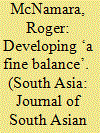

|
|
|
|
|
| Summary/Abstract |
This paper intervenes in the debate over whether secularism can protect religious minorities in India or whether alternative models are needed. I explore this issue by examining Rohinton Mistry's novel Family Matters, which focuses on religious extremism within the minority Parsi community. The novel suggests that the individual needs to maintain ‘a fine balance’ between religious beliefs and personal rights. It recognises that secularisation has shaped modern religious identity and, consequently, facilitated religious extremism. By de-coupling religion from secularisation, Mistry demonstrates that religion need not be rigid and can adapt to different social circumstances, while continuing to provide moral strength.
|
|
|
|
|
|
|
|
|
|
|
|
|
|
|
|
| 3 |
ID:
120999
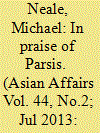

|
|
|
|
|
| Publication |
2013.
|
| Summary/Abstract |
There has been a catastrophic decline in the numbers of India's vultures, on which the Parsis once depended for the disposal of their dead. Parsi numbers are falling too. Their community represents only 0.0005 per cent of the population of the Indian subcontinent, yet they have made such a mark in so many walks of life. Could Zoroastrian culture explain their disproportionate success? Parsi shipbuilders built frigates of Malabar teak for the British Navy and the EIC, Parsis provided the brains behind India's nuclear programme, the backbone of India's manufacturing industry and such international musical icons as Zubin Mehta and Freddie Mercury, as well as the first Asian MPs at Westminster and the first Indian cricket team to tour England,. Parsi merchant-princes made fortunes in the opium trade yet rivalled Andrew Carnegie in their philanthropy.
|
|
|
|
|
|
|
|
|
|
|
|
|
|
|
|
| 4 |
ID:
091287
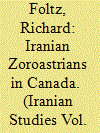

|
|
|
|
|
| Publication |
2009.
|
| Summary/Abstract |
Canada, now the number-one destination for Iranian migrants, is home to one of the world's most dynamic Zoroastrian communities, in which Iranians are increasingly represented and are playing ever more visible roles in maintaining and transforming the tradition. While exile has in some ways reunited Iranian and Parsi (South Asian) Zoroastrians after more than 1,000 years of separation, cultural and in some cases religious differences mean that they continue largely to live in separate spheres even while sharing their places of worship. Iranian Zoroastrians in Canada participate in some social settings as Iranians, in others as Zoroastrians, and in still others as Canadians, but to a large extent they remain a community unto themselves separate from these other three. Even so, their generally progressive interpretations of Zoroastrianism are having an influence on Parsi communities worldwide as well as on Zoroastrians in Iran, and being often recognized as "original Iranians" they are playing important roles in promoting awareness of Iranian culture within the broader community.
|
|
|
|
|
|
|
|
|
|
|
|
|
|
|
|
| 5 |
ID:
188841
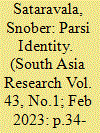

|
|
|
|
|
| Summary/Abstract |
This article discusses the politics of identity and narratives of the Parsi minority community in India, who are Indian Zoroastrians on the brink of extinction. The mapping of the mythical construction of the Parsis by the Parsis themselves is contrasted with representations by popular culture. The main concern is that when there are no more Parsis left in South Asia to participate in this dialogue regarding the manufacture of identity, unchallenged stereotypes will persist, to the disadvantage of the community. Specifically, the character of the mad Parsi (yeda) in Hindi cinema will remain predominant in popular imagination, while narratives of great Parsi entrepreneurs will be absorbed into general narratives of the nation, and collective memory will privilege the queer, the fool, the drug dealer or the anti-Christ.
|
|
|
|
|
|
|
|
|
|
|
|
|
|
|
|
| 6 |
ID:
189068
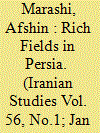

|
|
|
|
|
| Summary/Abstract |
This article investigates the history of economic relations between Iran and the Parsi community of India during the Reza Shah period. Encouraged by the policies of the new Pahlavi state, Parsi entrepreneurs began a serious effort to investigate the possibilities of economic investment in Iran. The article details three Parsi economic missions that were conducted in Iran during this period, and analyzes their assessments of Iran's potential for development in fields such as energy, textile manufacturing, commercial agriculture, and modern transportation systems. As the article argues, while these Parsi-led initiatives were part of a larger history of renewed engagement between Parsis and Iranians, for a variety of political and economic reasons, by the outbreak of World War II few of the Parsi plans for investment in Iran had come to fruition. While remaining largely forestalled in the interwar period, the article also suggests that Parsi economic assessments foreshadowed many of the planning strategies carried out in Iran's post–World War II history of economic development.
|
|
|
|
|
|
|
|
|
|
|
|
|
|
|
|
|
|
|
|
|